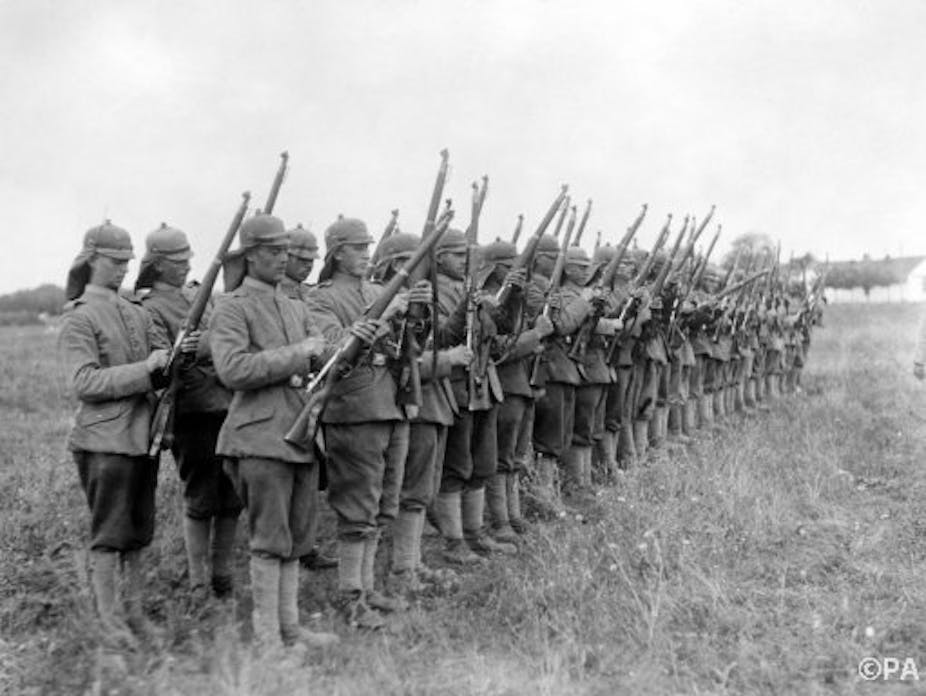While communities around the UK commemorate the British “conchies”, it is easy to forget the international dimension, especially when it comes to German anti-war activists. This is partly due to how the war itself is considered. This perspective is exemplified by Michael Gove’s view of the First World War as a just war, fought against German militarism:
The ruthless social Darwinism of the German elites, the pitiless approach they took to occupation, their aggressively expansionist war aims and their scorn for the international order all made resistance more than justified.
And this is certainly how Germany was presented in the British press and propaganda from the very start of the war, mainly driven by atrocities – some imagined, some all too real – committed by the German troops during the invasion and occupation of Belgium.
Listen to Ingrid Sharp talk about conscientious objectors on The Anthill podcast episode on World War I here, or subscribe wherever you get your podcasts.
Germany in 1914 was a society dominated by military values. But it would be wrong to think that this was accepted without opposition – that World War I was fought without any dissenting German voices.
Pacifist, anti-war voices were effectively suppressed by military censorship, and those working for peace were isolated, persecuted and imprisoned. But they were not completely silenced.
Although there was no provision in German conscription laws for exemption, as there was in the UK, there is evidence that there were cases of conscientious objection. These were mostly religiously motivated within very small sects such as Mennonites, Jehova’s Witnesses (known then as Ernste Bibelforscher or Bible Students) and Adventists. Soldiers from these groups were often informally accommodated in non-combatant roles.
But conscientious objectors who took the absolutist position, or were politically rather than religiously motivated, had no public platform like their counterparts’ tribunals in the UK. As there was no legal basis for their objection there were no legal cases. They most often found themselves in mental asylums or prisons on the grounds that a German man refusing to do his military duty was either mad or criminal.
There are no reliable figures, no memoirs, no supporting organisations for these people. Such references to them as exist are in medical journals. Sending conchies who refused non-combatant service for psychiatric assessment was one way of discrediting their position and also getting rid of potentially troublesome individuals. And if they were not considered insane, they were liable to lengthy terms of imprisonment for “desertion”.
The best-known example of a German conscientious objector is the radical anarchist socialist, Ernst Friedrich. Friedrich refused to serve in 1914 and was sent for psychiatric assessment. When called up again in 1917, he ended up in prison for an act of sabotage and was only released by revolutionary troops in 1918. He joined the revolutionary barricades, showing that he was not unwilling to fight, but only for social justice and against the causes of further wars.
Ernst Friedrich went on to achieve international notoriety in the post-war period for his famous book Krieg dem Kriege (War Against War), published in 1924. In it he argued that children were socialised into war by their parents and by playing with war toys, and that war benefited the social and economic elite.
He also debunked claims about the glory of war and death on the battlefield by reproducing photos of soldiers committing atrocities, with prostitutes, ignominiously dead and unburied on the battlefield or grotesquely injured. These images were often ironically juxtaposed with photos that expressed the civilian view of the war, or extracts from sermons or comments by the military or governing elite. Especially shocking were images of facial injuries that had been kept hidden from the public, even from the soldiers’ families.
Towards the end of the Weimar Republic, Friedrich was subject to repeated prosecution. He spent the whole of 1930 in prison and fled in 1933 from the Nazis, who turned his anti-war museum into first a Nazi headquarters and then a torture cellar.
Pioneers of peace
As a defeated nation, Germany found it hard to resist the moral charges against her in the aftermath of war. The moral responsibility for the war was German, and the accusation of war crimes and atrocities was accepted by the international community. They were excluded from international organisations, including the newly-formed League of Nations, and treated as pariahs on the international scene.
The previously suppressed voices of the peace movement took on a new importance during this period. They emerged, breaking the impression of monolithic Prussian militarism, and showing the possibility of German moral courage. In this way, such voices helped to overcome the overwhelming international antipathy to the entire German nation.
German pacifists could then be part of the international groups seeking peace and reconciliation. And in this way, German reintegration into the international scene happened long before it was officially allowed to join the League of Nations in 1926.
Awareness of these forms of resistance and the enormous difficulties anti-war activists had in reaching the public make an important contribution to our understanding of World War I and Germany’s response to it.
The German government effectively silenced voices for peace between 1914 and 1918, and the Nazis silenced them again after 1933. This is all the more reason why they should be listened to and taken seriously today as we mark its centenary.

